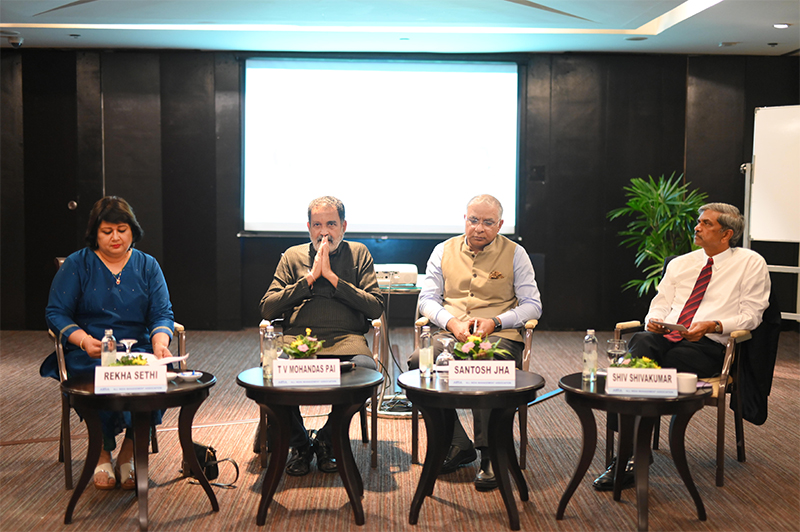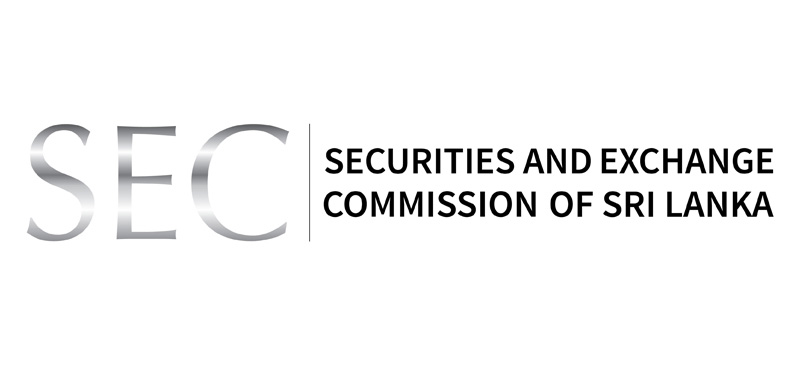Business
India, first country to back Sri Lanka’s IMF relief programme – IHC Santosh Jha

By Ifham Nizam
In overcoming the worst crisis in Sri Lanka’ s history, the country’s neighbor, India, became the leading backer of the International Monetary Fund (IMF) relief programme, India’s High Commissioner to Sri Lanka Santosh Jha said.
“Our desire to work closely with the government and the people of Sri Lanka manifested most visibly during the Covid-19 pandemic and the economic crisis in Sri Lanka in 2022. Our response was driven by our neighbourhood-first policy, which is based on a strong sense of solidarity and an outcome based, non- reciprocal and generous approach, H.C. Jha said at a recent forum held at the Cinnamon Grand, Colombo titled, ‘Colombo Leadership Retreat: Aspire, Achieve, Inspire: Women in Leadership Roles’.
H.C. Jha added: ‘India stood shoulder- to- shoulder with the people of Sri Lanka as a trusted and reliable friend. We provided foreign exchange support as well as helped to source essential items like fuel, food and medicines from India. Overall, we deployed concessional loans and credit facility of around USD 4 billion.
‘I congratulated the All India Management Association (AIMA) for organizing the event to promote dialogue about and between the women leaders of India and Sri Lanka.
‘I am confident that such events will not only bring the peoples of our two countries together and forge deeper economic, social and intellectual exchanges but will help in promoting greater access for women to leadership roles in all sectors and organizations.
‘I am delighted that AIMA has gathered some top business leaders from India and Sri Lanka to address this exclusive event over the next three days. The presence of leaders of the industry such as Mr Pai and Mr Shivakumar here today attest to the importance and seriousness attached to this event.
‘The visit of President Ranil Wickremesinghe to India in July 2023 had created further momentum to the multifaceted partnership. During the visit, our countries adopted a vision document for strengthening India-Sri Lanka ties, centred on enhanced connectivity and promoting a deeper economic partnership. Our governments are closely working together to transform this vision into reality.
‘We are exploring synergies in new areas to achieve our economic and developmental aspirations jointly.
‘India strongly advocated international support for Sri Lanka at various fora. We were the first country to provide financing assurances to the IMF for the Extended Fund Facility programme to Sri Lanka. We co-chaired an Official Creditors Committee with Sri Lanka’s other bilateral creditors to hold discussions on debt restructuring.
`As in other neighbouring countries, development partnership is one of the strongest pillars of our bilateral relationship with Sri Lanka. We are undertaking projects through concessional lines of credit and grant assistance. Our support is to the tune of USD 5 million. We are involved in rehabilitation and modernization of Sri Lanka Railways; construction of houses for the poor; solar electrification of religious places; port development, renewable energy and connectivity, among others. One of the principal vehicles for project implementation has been the high impact community development project. This is particularly useful as it enables us to implement a larger number of relatively smaller projects with high community impact. It also enables us to cover all the different provinces of Sri Lanka, including remote locations and underprivileged sections.
‘Apart from this, India’s private sector is also contributing to infrastructure development in Sri Lanka. The newest addition to Sri Lanka’s skyline, ITC, is built with an investment of about USD 500 million.
`The West Container Terminal at Colombo Port and renewable energy projects in the North are some other shining examples of recent Indian investments in Sri Lanka. These projects are a symbol of the trust that Indian companies repose in the Sri Lankan economy and its people.
‘We are advancing multiple energy connectivity initiatives. These include the power grid connectivity, eventually to enable Sri Lanka to export power to India; the multiproduct pipeline to Trincomalee, which will help advance the Trincomalee Tank Farms and Harbour interests; and we are also working to set up a virtual LNG pipeline from Kochi to Colombo. These are in addition to the power projects that I have mentioned earlier, which along with the NTPC solar power project at Sampur promises to transform the Sri Lankan energy mix and profile.
‘It is well known that India is Sri Lanka’s largest trading partner. In 2022, bilateral merchandise trade between India and Sri Lanka stood at USD 6 billion.
`Our governments have recently resumed discussions on the Economic and Technology Cooperation Agreement, which seeks to further advance our trade and economic partnership beyond the Free Trade Agreement, which came into force in 2000. Once signed, it will help in achieving the true potential of the India-Sri Lanka trade partnership. If we go by the FTA experience, it will enable Sri Lanka to significantly expand its exports both in goods and services to India. This is also our objective in keeping with our Neighbourhood-First policy.
‘India has also been the largest source of investments to Sri Lanka in the past four years. We continue to work to generate greater interest among Indian industries to maintain this trend. Investments in infrastructure, energy, renewable energy, transport and telecommunications, among others, are likely to assist us in this regard.
`In the last 10 years we have emerged from being the 10th largest economy to becoming the 5th largest in the world. We are confident that by 2027-2028, we should emerge as the 3rd largest economy. Riding on economic reforms and various government programmes, such as the production linked incentive scheme, we seem to be on the cusp of a big manufacturing boom in India. However, the biggest stories are from the ongoing digital and green transition in India.
‘Not many in Sri Lanka may be aware that India is the only G20 country that is on track to implement and even exceed its Paris Climate commitments. The Climate Change Performance Index, rates India 10 places above the European Union, which is traditionally perceived as the climate leader. Our national electricity authority projections for 2032, predict that 68.4% of our energy capacity will come from non-fossil sources. We are promoting renewables at a breathtaking speed and also implementing ambitious targets for green hydrogen. Existing investment commitments and ongoing project implementation would confirm that green energy growth in India will maintain its current leadership of the climate agenda. There are of course also India-led initiatives, such as the International Solar Alliance, the Coalition for Disaster Resilient Infrastructure and the Life Initiative that are existing manifestations of our climate leadership.’
Introductory remarks at the forum were made by Rekha Sethi, Director General, AIMA. Welcoming remarks were by T V Mohandas Pai, chairman, Aarin Capital Partners and concluding remarks were by Shiv Shivakumar, Operating Partner at Advent International Private Equity and former chairman, PepsiCo India.
Business
SEC Sri Lanka eases Minimum Public Holding Rules for listings via introductions to boost market flexibility

The Securities and Exchange Commission of Sri Lanka (SEC) has approved amendments to the Colombo Stock Exchange (CSE) Listing Rules to provide greater flexibility regarding the Minimum Public Holding (MPH) requirement for companies listing through the Introduction method.
These revisions were proposed and deliberated under Project 6 – New Listings (Public and Private), one of 12 key strategic initiatives launched by the SEC to strengthen Sri Lanka’s capital market framework. Project 6 aims to drive national capital formation, promote listings by highlighting benefits and opportunities for listed entities, and attract large-scale corporates to enhance market depth, liquidity, and investor confidence.
The amendments reflect a joint effort by the SEC and CSE, underscoring strong collaboration between the regulator and the Exchange to address evolving market needs while maintaining market integrity, transparency, and investor protection.
The salient features of the amendments to the CSE listing Rules are as follows;
Entities seeking listing by way of an Introduction on the Main Board or Diri Savi Board that are unable to meet the MPH requirement at the time of submitting the initial listing application, may now be granted a listing, subject to certain conditions on compliance.
Non-public shareholders who have held their shares for a minimum period of eighteen months prior to the date of the initial listing application may divest up to a maximum 2% of their shares each month during the six months commencing from the date of listing, and simultaneously, be subject to a lock-in requirement of 30% of their respective shareholdings as at the date of listing, until MPH compliance or 18 months from the date of listing, whichever occurs first.
A phased MPH compliance framework has been introduced requiring a minimum 50% compliance with MPH requirement within 12 months and full compliance within 18 months from the date of listing.
Entities should include clear disclosures in the Introductory Document confirming their obligation to meet MPH requirements within the prescribed timelines.
In the event of non-compliance with the MPH requirement, certain enforcement actions have also been introduced.
The revised framework is expected to encourage more companies to consider listing via Introduction, thereby broadening market participation, improving liquidity, and contributing to the overall development of Sri Lanka’s capital market. Issuers, investors, and market intermediaries will benefit from a more enabling yet well-regulated listing environment.
Business
Manufacturing counters propel share market to positive territory

Stock market activities were positive yesterday, mainly driven by manufacturing sector counters, especially Sierra Cables, Royal Ceramics and ACL Cables. Further, there was some investor confidence in construction sector counters as well.
Amid those developments both indices moved upwards. The All Share Price Index went up by 150.54 points, while the S and P SL20 rose by 41.5 points. Turnover stood at Rs 4.65 billion with six crossings.
Those crossings were reported in Royal Ceramics which crossed 3.8 million shares to the tune of Rs 174.3 million; its share s traded at Rs 45.20, VallibelOne 1.4 million shares crossed to the tune of Rs 138.6 million; its shares traded at Rs 99, Melstacorp 500,000 shares crossed for Rs 87.24 million; its shares traded at Rs 174.50, Sierra Cables two million shares crossed for Rs 68.2 million, its shares sold at Rs 34.30, Kingsbury 1.5 million shares crossed for Rs 31.8 million; its shares traded at Rs 21.20.
In the retail market companies that mainly contributed to the turnover were; Sierra Cables Rs 418 million (20 million shares traded), Royal Ceramics Rs 363 million (eight million shares traded), Colombo Dockyards Rs 323 million (1.7 million shares traded), ACL Rs 311 million (3.5 million shares traded), Renuka Agri Rs 149 million (12.3 million shares traded), Sampath Bank Rs 94.7 million (648,000 shares traded) and Bogala Graphite Rs 86.4 million (529,000 shares traded). During the day 122.8 million shares volumes changed hands in 34453 transactions.
Yesterday the rupee opened at Rs 310.00/25 to the US dollar in the spot market, weaker from Rs 310.00/310.20 the previous day, dealers said, while bond yields were broadly steady.
By Hiran H Senewiratne
Business
Atlas ‘Paata Lowak Dinana Hetak’ celebrates emerging artists nationwide

Atlas, Sri Lanka’s leading learning brand, reaffirmed its purpose of making learning fun and enjoyable through the Atlas All-Island Art Competition 2025, which concluded with a gifting ceremony held recently at Arcade Independence Square under the theme ‘Atlas paata lowak dinana hetak’. Students from Preschool to Grade 11 showcased their talents across five categories, with all island winners receiving cash prizes, certificates, and gift packs. Additionally, merit winners in each category were also recognized. The event brought together students, parents, and educators, highlighting Sri Lanka’s cultural diversity, nurturing young talent, and reinforcing Atlas’s long-standing commitment to education, creativity, and building confidence among schoolchildren. The event concluded with the ‘Atlas Art Carnival’, which brought children and parents together through games and creative art activities in a fun and lively atmosphere.
-

 News6 days ago
News6 days agoStreet vendors banned from Kandy City
-

 Sports3 days ago
Sports3 days agoGurusinha’s Boxing Day hundred celebrated in Melbourne
-

 News6 days ago
News6 days agoLankan aircrew fly daring UN Medevac in hostile conditions in Africa
-

 News1 day ago
News1 day agoLeading the Nation’s Connectivity Recovery Amid Unprecedented Challenges
-

 Sports4 days ago
Sports4 days agoTime to close the Dickwella chapter
-

 Features6 days ago
Features6 days agoRethinking post-disaster urban planning: Lessons from Peradeniya
-

 Opinion6 days ago
Opinion6 days agoAre we reading the sky wrong?
-

 Features2 days ago
Features2 days agoIt’s all over for Maxi Rozairo













